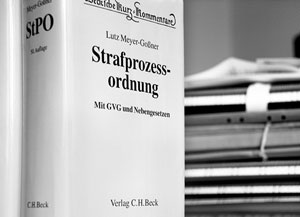| |


|
|


Tip: What to do with a
search/house search?
When the investigating authorities suspect that you have evidence at home which
could be important for the investigation, they can search your home, your office, or even your car. This happens either on the basis of a search warrant authorised by a judge or – if there is insufficient time for this – through imminent danger in delay.
Usually the authorities will seize any evidence they find, regardless of whom it belongs to. The only thing that counts is whether - in the opinion of the authorities - the evidence is important to the investigation.
You cannot stop them carrying out a search. You have to let it happen. But that's all you have to do. You should bear the following tips in mind:
- No matter how unexpected and unpleasant the search is: keep your cool! During the search remain as impassive as you can. You are not obliged to participate in any way!
- Do not obstruct the authorites as they do their job. They could then take you into custody. In addition, you could make yourself liable for prosecution if you try to resist. The legality of the search and the following defence will be assessed later.
- You are in no immediate danger! If the police wanted to detain or arrest you, they would already have done so.
- Don't say anything about the allegation! Don't speak to the
authorities about the matter. Partners or members of staff are not
obliged to make any statement. These people too should remain silent. You have a right to tell them not to give out any information.
- Inform your defence counsel without delay! You are legally entitled
to inform a defence counsel at any stage of the investigation
and to ask him for advice. If possible you should call in your defence counsel.
He will monitor the legality of the investigative measures. The
search officials are not obliged to wait until the defence counsel arrives, before beginning the search. Experience shows, however, that the officer-in-charge can be responsive to a polite request.
- Ask the officer-in-charge for his name and identification.
- Before the search begins ask for an official copy of the judicial search warrant. If there is no search warrant, ask the reason why there is an imminent danger in delay. The search warrant will reveal what evidence is being sought. If a particular piece of evidence is being sought, you should consider whether it would be preferable to bring this out voluntarily. The search would then have to stop. This would avoid anything else being accidentally found which could involve further action being taken against you!
- Try to call in somebody you trust to act as a witness to the search.
- Seek permission to make copies of important documents which are to be seized, or request that you have copies made available to you.
- If documents or other evidence has been found or seized, request a list of the evidence which has been taken by the investigating authorities.
- Protest against to any possible seizure! Only then does a judge have to decide whether the article(s) may be seized or not. In case of doubt you should sign nothing!
Further tips
Crimimal law – defence
Criminal law | Criminal law on sexual offences | Fiscal law | Traffic criminal law | Commercial law
|


